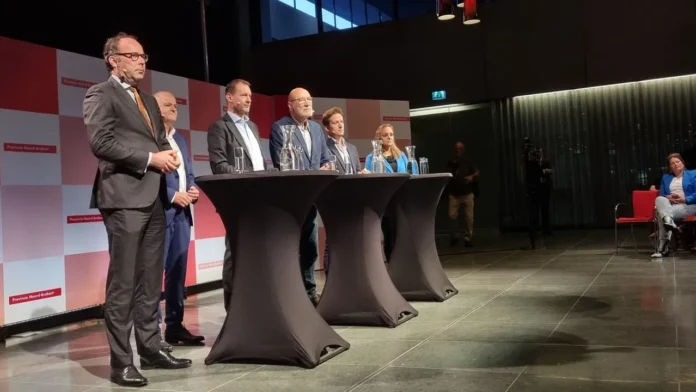The new coalition of Brabant province, announced what it wants to achieve over the next four years. After months, Noord-Brabant is the last province with such an agreement. Provincial political parties VVD, GroenLinks, PvdA, SP, D66 and Local Brabant formulated the plan.
Brabant province continues to push for the construction of more than 130,000 homes until 2030. 30 percent of these must become social housing. These houses must mainly be built within built-up areas. The province will only consider the outlying area if work can be carried out at a high pace.
2,000 Extra flexible homes must also be built quickly for people who find it difficult to find a house.
Energy
In order to be climate neutral by 2050, the coalition will continue to invest money in research into molten-salt reactors, a kind of small nuclear power plant. It will not be decided for the next four years whether such a reactor will actually be built.
The province will look into whether, in addition to the schemes of the national government and municipalities, it can contribute to large-scale insulation of houses and the installation of solar panels to combat energy poverty*.
The energy network in Brabant has been clogged since 2022. That is why the province wants to develop small energy networks. For example, by means of large batteries on business parks, filled with energy that is sustainably generated on those sites themselves.
Water and Nature
The province is doing everything it can to restore the vulnerable nature in Natura2000 areas, so that nature permits can be issued. No additional Natura2000 areas will be added in the next four years.
The province is also doing everything it can to achieve the goals in the Water Framework Directive (Kaderrichtlijn Water). In 2027, all water must comply with strict European rules. If this fails, Brabant can receive a hefty fine from the EU.
From now on, the following also applies to water: the user pays. For example, the extraction of ground and surface water must be limited. That is why the groundwater levy will also apply to small extractors, such as farmers, small industries and private individuals with their own groundwater well. This levy should apply from 1 January 2025. There is already a reporting obligation for small groundwater wells in the Brabantse Delta and De Dommel water board areas.
Traffic
The province wants to consult with schools on how public transport and class schedules can be coordinated. To stimulate the use of public transport, bus tickets will not become more expensive for the next four years. Brabant also wants to see whether night-time regional transport is feasible.
People from Brabant should be able to make more use of so-called ‘shared transport’ (‘deelvervoer’). For example, they share cars and loan bicycles. Subsequently, there will be several mobility hubs: transfer points where you can, for example, park your bicycle and take the shared car.
Due to the nitrogen problem, the expansion and tackling of various roads is under pressure. Over the next four years, the province does want to tackle the N629 (Dongen-Oosterhout), is asking the national government to tackle the N65 (Helvoirt-Vught) and will review the expansion of the N279 between Veghel and Helmond.
Brabant province wants to get rid of large-scale transport of hazardous substances by rail. That is why the new coalition wants to focus on more transport by water. The underground pipeline from Rotterdam to Limburg, for example for the transport of hydrogen, must also have branches to industrial estates in Brabant.
Agriculture
For dairy cattle and calves, the deadline for installing low-emission housing systems will be moved to January 1, 2026. For other animal species, the deadline of July 1, 2024 will remain in force.
To reduce their nitrogen emissions, farmers can choose to keep fewer animals, switch to organic farming, relocate or buy more land. In the coming years, the province will purchase land to help with this ‘extensification’.
The province will help farmers find other ways to set up their business. For example, they can continue partly as a nature manager, as a caravan shed or as a care farm.
Culture
Extra money goes to the libraries. Because these places are becoming increasingly important as a meeting place and for stimulating reading, writing and digital skills.
The new coalition also wants a major sporting event to come to Brabant once every four years.
County administrators
This week it also became clear which deputies should realize the plans. Here you can read which seven men and women they are In. (In Dutch).
Translated by: Shanthi Ramani
Source:Studio040
Ed.~
*What do we mean by energy poverty?
1 in 10 households in the Netherlands suffers from energy poverty. With the current developments in the energy market, chances are you will hear this term more and more often. Energy poverty occurs when a household has an energy bill that is actually too high for their income.











